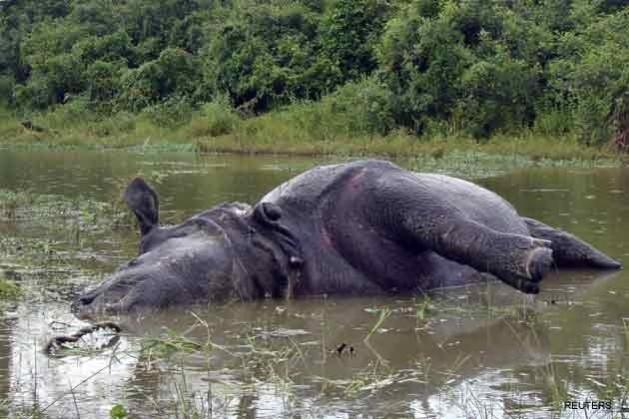
So, BBC's documentary One World: Killing For Conservation alleges that forest guards at Kaziranga National Park in Assam have been ordered to shoot anyone they deem a threat to the Rhino population. So what!
In fact, the Narendra Modi government should want the world to see its no-shit stance on poaching. Poachers should be hung from the nearest tree by their goolies and put on display as a warning to others who believe killing defenceless animals is an occupation.
Having not seen Justin Rowlatt's documentary, it's hard to say if the BBC have a stance on the alleged order or are simply reporting the facts. Either way, kudos to the people that actually gave forest guards permission to make poachers look like human watering cans.
The argument here is what if poachers kill innocent civilians, and it is a well-weighted one. But let me ask you: Would you walk through a field, knowing full well that it's mined? Or would you ask someone to show you the safest route through it? Idiot is as idiot does!
Rhinos are critically endangered; according to the World Wide Fund for Nature (WWF), the Black Rhino population has decreased by 97.6 percent from 1960.
Rhino horns crushed into so-called 'libido' powder is more expensive than cocaine, which has a greater chance of giving you the results you're looking for anyway. China is the target for this illegal and brutal trade and it's about time someone fought fire with fire.
Take for instance US veteran, Kinessa Johnson, who joined VETPAW. After doing four tours in Afghanistan, she signed up to the veterans' organisation sending battle-hardened soldiers to Africa to take on poachers.
"We're going over there to do some anti-poaching, kill some bad guys, and do some good." Johnson said in an interview. And while VETPAW doesn't go in with the intention of killing poachers, they will stand their ground...and we all know what that means.
Killing poachers, however comforting it may seem, will do little to stop the illegal trade in tusks, horns and pelts.
An article in The Horn explains that poachers are often at the bottom of the chain of command. And while killing them may hamper supply, it can never stop it, until the people at the top are apprehended.
Bobb Langland, commenting in Save the Rhino, says, "The time has come to extend extraordinary measures to ensure that our animal population is allowed to exist in the manner in which they were intended before man came along and ruthlessly exploited them. I also include property developers that love to develop properties to allow people to 'commune' with nature, and then when these people actually meet the animals that inhabit these areas, find that they are 'dangerous', and want them eliminated so that they feel 'safe'."
It is the inability to prosecute poaching cases, or at least prosecute them effectively enough so as to send out a strong deterrent, that makes so many people gravitate to the 'extreme solution.'
But until such time as we have a system in place that will see those at the very top of poaching rings brought to book, then we should have no qualms about pulling the proverbial trigger...heaven knows the poachers don't.















